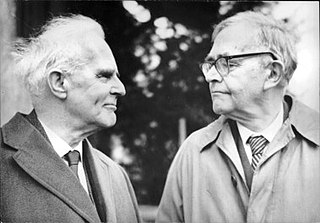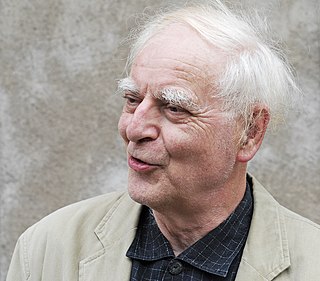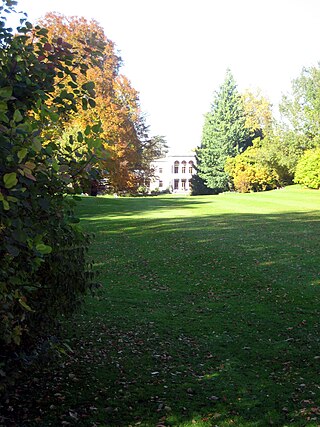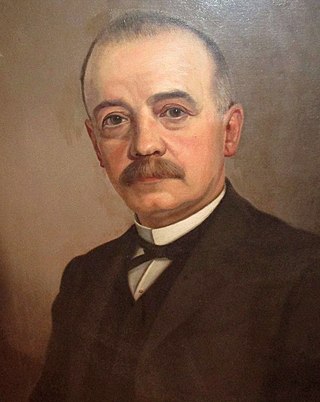Related Research Articles

The University of Zurich is a public research university located in the city of Zurich, Switzerland. It is the largest university in Switzerland, with its 28,000 enrolled students. It was founded in 1833 from the existing colleges of theology, law, medicine which go back to 1525, and a new faculty of philosophy.

Alois Brunner was an Austrian officer who held the rank of SS-Hauptsturmführer (captain) during World War II. Brunner played a significant role in the implementation of the Holocaust through rounding up and deporting Jews in occupied Austria, Greece, Macedonia, France, and Slovakia. He was known as Final Solution architect Adolf Eichmann's right-hand man.

Sir John Tomlinson Brunner, 1st Baronet, was a British chemical industrialist and Liberal Party politician. At Hutchinson's alkali works in Widnes he rose to the position of general manager. There he met Ludwig Mond, with whom he later formed a partnership to create the chemical company Brunner Mond & Co., initially making alkali by the Solvay process. As a Member of Parliament he represented Northwich, Cheshire, in 1885–1886 and then from 1887 to 1910. He was a paternalistic employer and as a politician supported Irish Home Rule, trade unions, free trade, welfare reforms and, leading up to the First World War, a more sympathetic stance towards Germany. Brunner was a prominent Freemason, and a generous benefactor to the towns in his constituency and to the University of Liverpool. He is the great grandfather of the Duchess of Kent.
The Conrad-Ferdinand-Meyer-Preis is a literary award in memory of Conrad Ferdinand Meyer.

Heinrich Emil Brunner (1889–1966) was a Swiss Reformed theologian. Along with Karl Barth, he is commonly associated with neo-orthodoxy or the dialectical theology movement.

The Züriputsch of 6 September 1839 was a putsch of the rural conservative population against the liberal rule of the city of Zurich on the eve of the formation of the Swiss federal state. The reason for the putsch was the appointment of the controversial German theologian David Strauss to the theological faculty of the University of Zurich by the liberal government. The rural population saw the old religious order in danger.
Tages-Anzeiger, also abbreviated Tagi or TA, is a Swiss German-language national daily newspaper published in Zurich, Switzerland.
Léopold Szondi March 11, 1893 – January 24, 1986) was a Hungarian psychiatrist and psychoanalyst, psychopathologist and Professor of psychology. Founder of the concept of fate analysis. He is known for the now-discredited psychological tool that bears his name, the Szondi test.

Adolf Muschg is a Swiss writer and professor of literature. Muschg was a member of the Gruppe Olten.

Italy competed at the 1998 Winter Olympics in Nagano, Japan.
St Mark Passion refers to the Passion of Christ as told in chapters 14 and 15 of the Gospel of Mark.
The St Mark Passion, BWV 247, is a lost Passion setting by Johann Sebastian Bach, first performed in Leipzig on Good Friday, 23 March 1731. Though Bach's music is lost, the libretto by Picander is still extant, and from this, the work can to some degree be reconstructed.

The Greek Passion is an opera in four acts by Bohuslav Martinů. The English-language libretto, by the composer, is based on Jonathan Griffin's translation of the novel Christ Recrucified by Nikos Kazantzakis.

The Rieterpark is a park in central Zurich, Switzerland. Richard Wagner lived at Villa Wesendonck in Reiterpark from 1849 to 1858 where he worked on Tristan.
Conrad Brunner was a Swiss physician, surgeon and medical historian. He was particularly concerned with the disinfection of wounds and their healing.
Markus Schäfer is a German lyric tenor, a soloist in opera, oratorio, and Lied. He has performed with major opera houses and with the ensemble La Petite Bande. He has been a professor of voice at the Musikhochschule Hannover.
Adolf Brunner may refer to:
Ernst Brunner was a Swiss documentary and ethnographic photographer.

Meinrad Iten was a Swiss portrait and landscape painter; associated with the Düsseldorfer Malerschule.
References
- ↑ Chris Walton - Adolf Brunner (1901-1992): Erinnerungen eines Schweizer 1997 "Markus-Passion Siehe: Passionsgeschichte nach dem Evangelisten Markus Der Mensch (Matthias Claudius): Empfangen und genähret vom Weibe wunderbar Motette für 6-stimmigen gemischten Chor [SSATBB]. Komponiert: Zürich, 1938.
- ↑ Fanfare - Volume 10, Issues 1-2 - Page 123 Joel Flegler - 1986 "Adolf Brunner was born in Zurich in 1901 and wrote his St. Mark Passion in 1970 and '71. I get these dates from S.W.E., as they are not provided in the German — only liner notes. This setting of the passion is awfully conservative even for a ..."